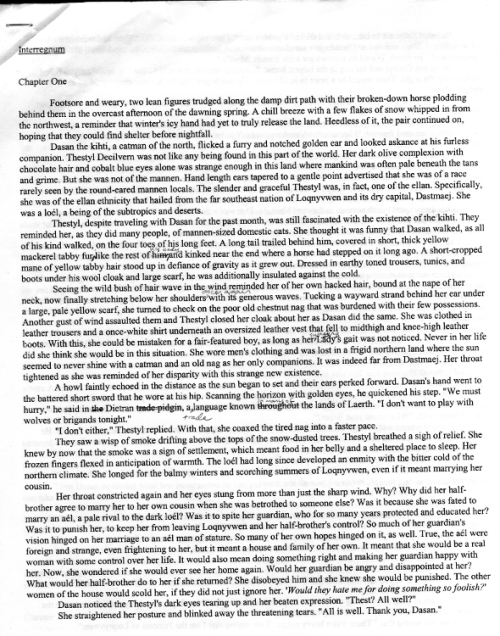While rummaging through my shelves and crates to find empty three-ring binders, I found one old binder stuffed full with notes and drawings for an old novel in progress under the working title of Interregnum. Nestled among the pages was a printed copy of the story. This particular copy of Interregnum was the last complete draft printed, dating to 2005. Ten years ago.
Past the sharp scents of old paper and aging plastic, I recalled sitting in plazas and study rooms during my last university years and scribbling down the editing notes that litter the lines of text. A story I once knew came to life again as I flipped through the pages in my rapid reading. The writing was rougher than I liked, but it bore my basic rhythms of prose. I’ve learned a great deal about writing, including things like pacing and tone, since then. Characters long forgotten bantered in energetic exchanges. Main and secondary characters all possessed unique voices, especially when they teased and ribbed each other. Even the mercenary captain, who became increasingly dour during the waning drafts, was allowed to have some fun and have fun poked at her expense.
This draft suffered from the traveling bug, spending far too much time on the road to get from point A to point B, yet rushing through for the sake of expediency. My notes remark on this, advising to spend some time at certain locations. Show the mercenaries earning their pay, show the lost princess gaining and honing her skills, show the mercenary captain in command. Illustrate the duality of hard power and soft power through the approaches of the mercenary captain and the lost princess. Let the mercenary captain and lost princess make mistakes and figure out how to recover from them. Show the core characters bonding with one another. Spend the time to make it work.
However, that wasn’t going to happen. I wasn’t the sole writer in this project. There was a co-writer involved and she had different priorities. The waiting political drama took precedent over the journey. Here, the tone changed from my punchy prose to the co-writer’s aspirations of loftier lines. It made sense for the tone to shift with the focus and reflect the machinations of refined nobility. My words still wove through those sections to prevent a hard jarring of the reader, but the change was still noticeable. As the next draft progressed, the mercenaries were pushed further and further back, while the political drama consumed all of our collective resources.
My notes in the two years after this printed draft show a great deal of struggle with reconciling the elements of the story, even as I admitted to myself that Interregnum had morphed into two different tales. The first book should have been nothing but the journey, then the second focusing on the political drama. That’s a more experienced eye, clarified by hindsight, and has no bearing on the past. Scattered among the notes are multiple attempts at rewrites, a few as fresh starts to help cast new perspective. Those clusters of notes through 2007 show a great deal of frustration, both at fixing the pacing and reconciliation problems and at my co-writer’s growing disinterest. As Interregnum languished, I realized that I could be spending my time working on other projects.
Driven by the need to be working on some sort of original writing project and unwilling to break apart Interregnum after laboring on it for so many years, I started to craft a new story. I threw so many ideas at the proverbial wall, hoping one would stick. One did and that idea grew into the Black Mark series. Interregnum was ultimately broken and abandoned, though the circumstances of that sad event is another story.
As to those empty binders I was looking for, I found them after spending a while on my office floor and revisiting some old friends.

Leave a Reply